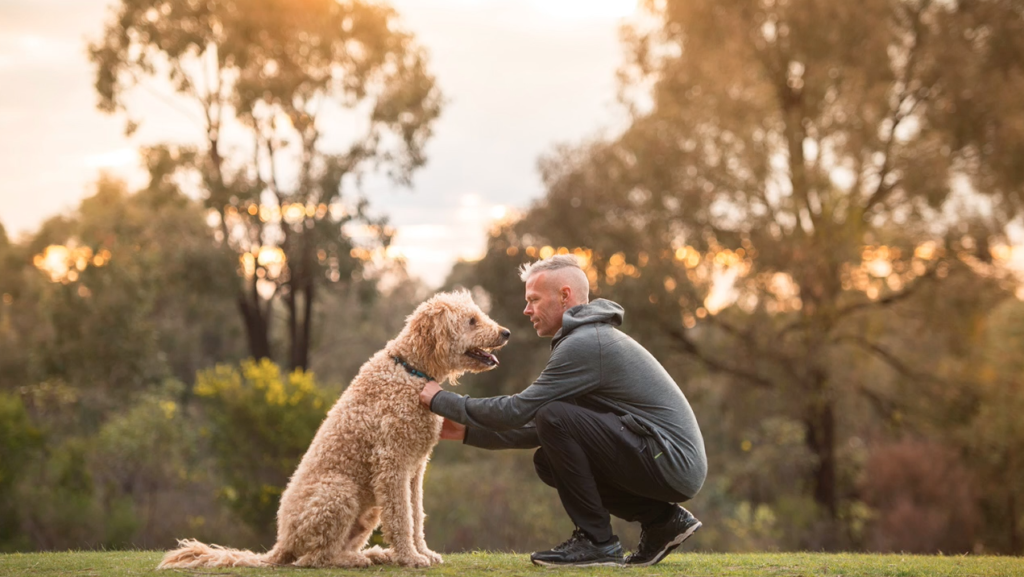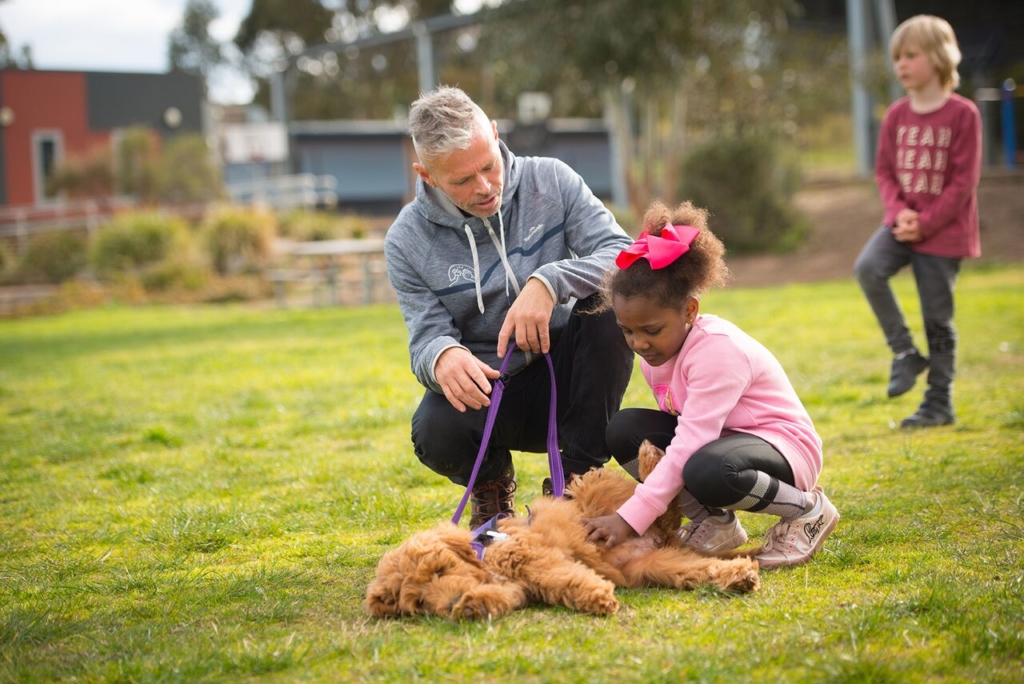Dogs Connect is a world-first mental health and wellness program.
We help you integrate a permanent wellbeing dog
into your workplace community.
How can dogs help with mental health?
People and dogs have been connecting naturally in many ways for centuries. Dogs provide emotional support, give people an opportunity for connection and can help with stress and anxiety.
Similar to some therapy dog programs, we connect communities with wellbeing dogs.
Our goal is to help your dog integrate into the community and achieve as many mental health benefits as possible.

Our wellbeing dogs can help with:
Trauma
Anxiety
Communication
Awareness
Leadership
Behaviour
Emotional regulation
The escalation cycle
Resilience
Sensory processing
Stress management
Emotional literacy
Dogs Connect has been featured in


Which communities and workplaces do we help?
Schools
Having a school wellbeing dog can help with attendance, behaviour, social connection and emotional regulation.
Special needs communities
Introducing a wellbeing dog into special needs communities can help build responsibility and social interaction.
Justice Centres
Dogs can have a positive influence on staff and offender mental health by providing an opportunity for nurturing and connection.
Aged care
Having a wellbeing dog in aged care can help residents feel less agitated and more at home.
Hospitals
Wellbeing dogs can offer caregivers moments of uplift, lightness, and connection throughout the long days and nights.
Emergency services
Our wellbeing dogs can help emergency service workers deal with the trauma they face on the job.
How does Dogs Connect work?
At Dogs Connect, we partner with your community to co-create a long-term, sustainable model that centres the wellbeing of both people and dogs. Every program is tailored to your unique context, and is built on best-practice, evidence-informed principles that meet or exceed international standards for Animal-Assisted Interventions.
We don’t place trained therapy dogs into communities—we guide communities to build relationships with a wellbeing dog who becomes a living part of your environment. This includes preparing your people, educating your community, and building the skills and understanding needed to ensure mutual, cross-species wellbeing.
Our approach is grounded in the Five Domains Model of Animal Welfare, and draws on contemporary research in trauma-informed practice, education, and canine behaviour. Our programs are aligned with the latest calls for ethical reform and regulation in the AAI sector, as detailed in recent peer-reviewed literature (Jones & Shannon, 2025).
Through our mentorship process, your staff and community members will:
-
Learn to understand and respond to canine communication and emotional states.
-
Build practical skills to ensure safety, consent, and agency for dogs in shared environments.
-
Embed positive, humane education values that model empathy, responsibility, and co-regulation.
Whether you’re responding to the impacts of trauma or natural disasters, looking to embed emotional literacy in your curriculum, or simply wanting to foster a more connected and compassionate culture, Dogs Connect provides the guidance, structure, and support to help your wellbeing dog thrive as a valued community member.
Therapy Dogs
Therapy dogs have been playing a very important role in supporting people in a therapeutic setting such as working with psychologists, speech therapists, occupational therapists, and a range of other supportive professional roles.
“When we engage in eye contact with a therapy dog or wellbeing dog, both the human and the dog experience an oxytocin release.”

The science behind this support and connection with a dog relates to some really powerful impacts that we experience when we connect with a dog in a safe and authentic way. These benefits are related to our heart rate which significantly reduces when making such a connection.
We also see recent scientific links which state that when we engage in such an interaction with a therapy dog or wellbeing dog we can experience an increase in oxytocin release.
One recent research concludes that when we engage in eye contact with a therapy dog or wellbeing dog, both the human and the dog experience such oxytocin release.
Another very recent article covers an Australian research project outlining likely positive impacts on emotional development of young people who experience such connections with wellbeing dogs.
Wellbeing Dogs
Wellbeing dogs play a slightly different role to therapy dogs as they connect with many, many people in their role as support for people in communities such as schools, correctional facilities, hospitals, and aged care settings.
Wellbeing dogs bring the same opportunities for positive impact as therapy dogs and offer the natural connection between mankind and dogs as well as eagerness to interact with many people within a program such as the Dogs Connect program.
We love to see and hear about therapy dogs and wellbeing dogs playing their role in the lives of people. If you are interested in learning more about the difference between a therapy dog and a wellbeing dog, feel free to contact us and we will happily find time to discuss this further with you.

Anxiety
We are constantly encouraged by more and more recent research findings and evidence around how dogs are supporting people who experience anxiety, trauma, and adversity in their lives.
Science tells us that when people are feeling stressed or experiencing anxiety even the act of patting and sitting with a dog they know causes a reduction in anxiety, a reduction in heart rate, and a feeling of calm.
We love that this science supports what wellbeing dogs do with so many people in schools and workplaces who experience anxiety.
Recent findings show us science has proven that when a person looks into the eyes of a wellbeing dog they are connected with, they experience a release of oxytocin and so does the dog. Can you imagine the impact this would have on people who experience anxiety, trauma, challenges in the home, school, or work life.
Of course, wellbeing dogs do so much more than just support people experiencing anxiety or trauma. When a wellbeing dog is authentically connected to a community the positive impacts are too many to list. Whether we see the interactions on a preventative level, or an intervention level, we have so much to learn about what is on offer in these moments.
We love and are constantly grateful for what wellbeing dogs are offering as support in schools and workplaces!
